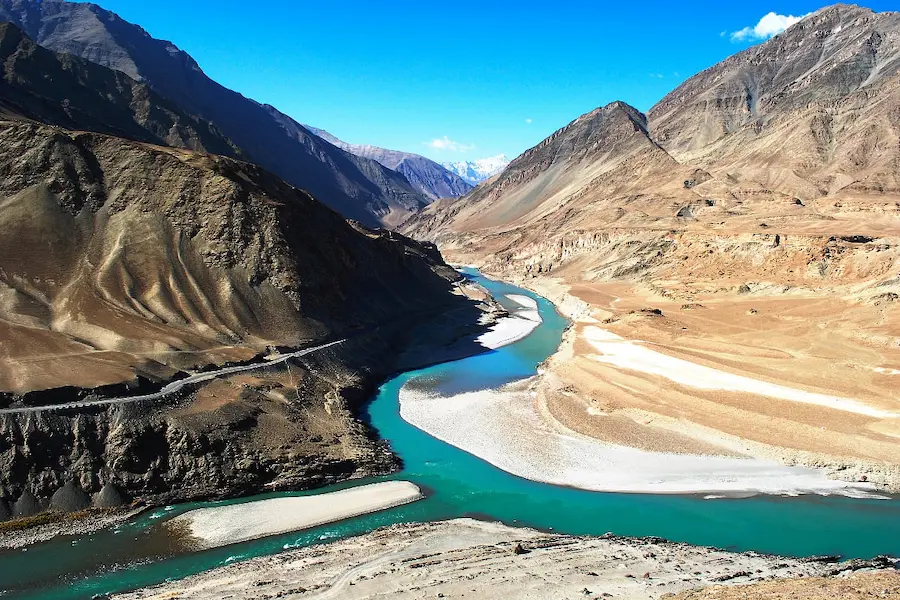
Union Home Minister Amit Shah announces that the Indus Waters Treaty with Pakistan will “never be restored,”
Treaty in Tatters: India’s Strategic Water Pivot
Indus Treaty Dead – In a landmark policy shift, Union Home Minister Amit Shah has declared that the Indus Waters Treaty (IWT) with Pakistan will “never be restored”, ending a 64-year-old water-sharing agreement that had withstood wars, diplomatic breakdowns, and decades of mistrust. Speaking in an interview with The Times of India, Shah stated unequivocally, “Paani Rajasthan tak jayega”, a phrase that has since become a rallying cry for India’s new water doctrine.
The IWT, brokered by the World Bank in 1960, allocated the three eastern rivers (Ravi, Beas, Sutlej) to India and the three western rivers (Indus, Jhelum, Chenab) to Pakistan. Despite multiple conflicts, the treaty endured as a rare example of cooperation. That changed after the April 22 terror attack in Pahalgam, Jammu and Kashmir, which killed 26 civilians and was allegedly orchestrated by Pakistan-based terror outfits.
India responded by suspending the treaty, citing repeated violations of its foundational principle, peace and progress. Shah emphasized that while international law prevents unilateral annulment, India has the right to place the treaty in abeyance, which it has now exercised.
Canal Diplomacy: Redirecting the Flow to Rajasthan
The government has already begun work on a 113-kilometre canal project that will divert excess water from Jammu & Kashmir to Rajasthan via Punjab and Haryana. This canal will connect the Chenab River with the Ravi-Beas-Sutlej system, allowing India to fully utilize its share of both eastern and western rivers.
Shah stated that Pakistan has been receiving water “unjustifiably” and that India will now prioritize its own agricultural and domestic needs. “We will use water that rightfully belongs to India,” he said, adding that the canal will help irrigate arid regions in Rajasthan and reduce dependency on groundwater.
This move is not just infrastructural, it’s deeply symbolic. It signals India’s intent to assert sovereign control over its natural resources, especially in the face of cross-border terrorism. Shah also linked the decision to broader national security concerns, noting that Pakistan’s use of terror as state policy invalidates any cooperative framework.
Regional Fallout and Global Reactions
Pakistan has condemned the move as a violation of international law, warning that blocking water flow could be seen as an “act of war.” Islamabad is reportedly exploring legal options under the Permanent Indus Commission and international arbitration mechanisms. However, India maintains that its actions are within the bounds of the treaty, which allows for full utilization of allocated waters.
The international community has responded with caution. While some Western nations have urged restraint, others have acknowledged India’s right to protect its citizens and resources. The World Bank, a guarantor of the treaty, has yet to issue a formal statement.
Domestically, the decision has been met with widespread support. Farmers in Rajasthan and Haryana have welcomed the move, while political analysts see it as a bold assertion of India’s strategic autonomy. Critics, however, warn that the escalation could further destabilize an already volatile region.
Conclusion
Amit Shah’s declaration marks a turning point in India’s approach to water diplomacy. By severing ties with the Indus Waters Treaty, India is not just redirecting rivers, it’s redrawing the geopolitical map of South Asia. As the canal to Rajasthan takes shape, the world watches closely, aware that in this region, water is not just a resource, it’s a weapon, a right, and a symbol of sovereignty.
Stay updated with the latest news on Rapido Updates. Keep yourself updated with The World, India News, Entertainment, Market, Gadgets, Sports, and many more